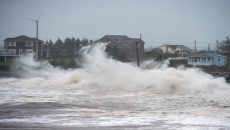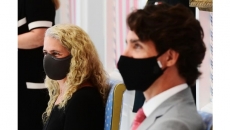Poor Canadians stand a greater chance of dying early than the well off and that gap has been growing for decades, says a detailed new analysis.
The study, published Monday in the Canadian Medical Association Journal, found the chances of dying before age 75 or of avoidable causes has been declining for almost everyone. But they've been declining for the rich much faster than for the poor and have been doing so for a generation.
The gap is growing for both women and men, the analysis found. And the chances of an early, avoidable death for women with the least education are actually growing.
"We've made no overall progress towards reducing overall health inequality," said Faraz Shahidi of the Institute for Work and Health in Toronto.
"The size of these inequalities in mortality are even larger than we previously thought."
Shahidi and co-author Abtin Parnia analyzed more than 16 million records from five different censuses and divided incomes into five groups. The incomes for each group varied from census to census. In 2016, the median household pretax income -- which would represent the middle group -- was $70,300.
The study found that for high-income men -- the top fifth of earners -- the mortality rate before age 75 declined by nearly 50 per cent between 1991 and 2016. For those in the bottom fifth, mortality declined by 34 per cent.
Education levels revealed the same pattern.
Premature deaths in men with a post-secondary degree declined by 47 per cent, but for men without a high school diploma the decline was 21 per cent.
The pattern was just as stark for women.
Premature death for high-income women declined more than 40 per cent, but 19 per cent for the less wealthy. Mortality rates for women with university degrees went down by more than one-third, but less than two per cent for those without a high-school diploma.
Shahidi found similar results when he looked at avoidable deaths caused by behaviours or by treatable conditions. For women with little education, mortality rates increased -- by up to 12 per cent for those who didn't finish high school.
The links between income, education and health have been well-established by previous research, Shahidi said.
"It's an inference," he said. "But it's an inference we make on a massive body of science telling us that people's everyday social and economic conditions are a fundamental factor driving health inequality."
Shahidi said eliminating the gaps in rates of early death is "virtually impossible" without reducing the income and education gaps that help create them.
"In the absence of policy action, we tend to see those inequalities widen," he said. "There are very actionable policy solutions which (governments) can put in place to address and reverse this trend."
Those measures include raising wages, more progressive taxation, generous social assistance, easier-to-access employment insurance and protecting job security.
"It's in a large part through lack of policy action that we have allowed, as a society, these inequalities to grow over time," said Shahidi.
"These health inequalities are fundamentally rooted in everyday conditions. And everyday social and economic conditions are what they are for people, because of the political decisions policy-makers make."






.jpg)